Antibodies produced naturally by the immune system recognize components of disease-causing agents to mark them for destruction. Monoclonal antibodies (mAbs) are laboratory synthesized to mimic these natural antibodies. The mechanism by which therapeutic mAbs protect against infectious diseases is similar to that of natural humoral immunity, although the details of microbe elimination are not completely defined. mAbs may be particularly useful for patients with compromised immune systems who may not be good candidates for receiving a vaccine (if available).
Potential uses of mAbs directed against SARS-CoV-2 include preventing or treating COVID-19, both areas under ongoing active investigation. Virus-neutralizing monoclonal antibodies are predicted to reduce viral load, ameliorate symptoms, and prevent hospitalization. Potential barriers for the use of mAbs include high costs and the requirement for parenteral administration. Despite these barriers, the use of mAbs are thought to be especially useful in pandemic settings given a lack of natural immunity within the population. Treatment of active disease and/or targeted prophylaxis might also be especially important in higher-risk individuals who require immediate protection.
Three anti-SARS-CoV-2 monoclonal antibody combinations have been granted Emergency Use Authorization (EUA) by the FDA: bamlanivimab plus etesevimab, casirivimab plus imdevimab, and Sotrovimab. On April 16, 2021, the FDA revoked its EUA for the use of bamlanivimab monotherapy, the first monoclonal antibody granted EUA status, given the increased prevalence of SARS-CoV-2 variants shown to be resistant to bamlanivimab when used alone. On June 25, 2021 the FDA paused all distribution of bamlanivimab plus etesevimab as the frequencies of SARS-CoV-2 Gamma and Beta Variants were increasing throughout the US. These monoclonal antibodies target the SARS-CoV-2 spike protein, which block viral entry into cells.
Data from controlled clinical trials demonstrated that high-risk patients who received COVID-19 monoclonal antibodies had a decrease in the risk of progression to severe disease, hospitalization, or death compared to patients who received placebo was used in support of the EUA. The use of combination monoclonal antibody therapy could be considered in certain high-risk populations in an attempt to prevent hospitalizations. Given questions of scarcity, we would recommend that significant steps be taken to prevent inequities in distribution across patient populations with access to combination monoclonal antibody therapies.
The safety and efficacy of these therapies for use in the treatment of hospitalized patients with COVID-19 continues to be evaluated. Currently, data does not support the use of monoclonal antibody therapy for patients hospitalized for COVID-19.
Clinical Circumstances
What severity of COVID-19 would you recommend use of this medication (i.e. mild, moderate, or severe illness; outpatient vs inpatient use)?
The use of combination monoclonal antibody therapies should be considered in non-hospitalized patients with mild-moderate COVID-19 who are at high risk for progression to severe COVID-19, hospitalization and death. Use of monoclonal antibody therapy has been endorsed by both the NIH COVID-19 guidelines (last updated May 24, 2021) and IDSA COVID-19 guidelines (last updated April 11, 2021).
The FDA EUAs for all available anti-SARS-CoV-2 monoclonal antibodies and combinations have the same criteria for use:
The following medical conditions or other factors may place adults and pediatric patients (age 12-17 years and weighing at least 40 kg) at higher risk for progression to severe COVID-19:
- Older age (for example, age ≥65 years of age)
- Obesity or being overweight (for example, BMI >25 kg/m2 , or if age 12-17, have BMI ≥85th percentile for their age and gender based on CDC growth charts)
- Pregnancy
- Chronic kidney disease
- Diabetes
- Immunosuppressive disease or immunosuppressive treatment
- Cardiovascular disease (including congenital heart disease) or hypertension
- Chronic lung diseases (for example, chronic obstructive pulmonary disease, asthma [moderate-to-severe], interstitial lung disease, cystic fibrosis and pulmonary hypertension)
- Sickle cell disease
- Neurodevelopmental disorders (for example, cerebral palsy) or other conditions that confer medical complexity (for example, genetic or metabolic syndromes and severe congenital anomalies)
- Having a medical-related technological dependence (for example, tracheostomy, gastrostomy, or positive pressure ventilation (not related to COVID 19))
Anti-SARS-CoV-2 monoclonal antibodies may be available through industry-sponsored compassionate use programs for the treatment of immunocompromised patients who are hospitalized because of COVID-19. It is not yet known whether these antibodies provide clinical benefits in people with B-cell immunodeficiency or other immunodeficiencies.
Would you recommend restricting this medication in some way?
Casirivimab/Imdevimab (REGEN-COV) are not authorized for use in patients:
- who are hospitalized due to COVID-19, OR
- who require oxygen therapy due to COVID-19, OR
- who require an increase in baseline oxygen flow rate due to COVID-19 in those on chronic oxygen therapy due to underlying non-COVID-19 related comorbidity.
The benefit of treatment with REGEN-COV have not been observed in patients hospitalized due to COVID-19. Combination monoclonal antibodies may be associated with worse clinical outcomes when administered to hospitalized patients with COVID-19 requiring high flow oxygen or mechanical ventilation.
Medication-specific Consideration
Dosing Recommendation:
Currently, there are no comparative data to assess efficacy and safety differences between the monoclonal antibody combinations, so there is no preference for one available product over the other. Both products have been recommended for use in outpatients with a positive COVID-19 PCR who are at high risk for progressing to severe COVID-19 infection. Surveillance of SARS-CoV-2 variants will play an important role in the future utility of monoclonal antibody therapy. Current combination therapies include the following:
- Casirivimab 600 mg plus imdevimab 600 mg (Total 1200 mg) was given EUA approval 6/2021and is the preferred dose
- Casirivimab 1,200 mg plus imdevimab 1,200 mg (Total of 2400 mg)
- Casirivimab and imdevimab has now been given EUA approval for use as BOTH intravenous infusion and subcutaneous infections. The intravenous infusion is the preferred method of administration
- Sotrovimab 500 mg intravenous infusion as a single dose given over 30 minutes. Injection is administered as a 500-mg/8-mL (62.5-mg/mL) solution in a single-dose viral for intravenous infusion
- Bamlanivimab 700mg plus etesevimab 1,400 mg – Currently on hold by the FDA given increased rates of circulating SARS-CoV-2 P.1/Gamma Variant and B.1.351/Beta Variant
Treatment with the monoclonal antibody combination should be started as soon as possible in a patient with a positive COVID-19 result and within 10 days of symptom onset.
Monoclonal antibody combinations must be diluted prior to administration as detailed in the tables below. Bamlanivimab/etesevimab should be administered through a PVC containing either a 0.2 or 0.22 micron in-line polyethersulfone filter while casirivimab/imdevimab requires a 0.2-micron filter. Sotrovimab requires a 0.2-micron filter polyethersulfone filter. No dose adjustments are needed for weight or renal/hepatic impairment.
Bamlanivimab (700mg) + Etesevimab (1,400mg) Dilution and Administration (Currently Unavailable):
(20mL bamlanivimab + 40mL etesevimab are added to the infusion bag)
|
Size of prefilled 0.9% sodium chloride infusion bag |
Maximum Infusion Rate |
Minimum Infusion Time |
|
50 mL |
310 mL/hr |
21 minutes |
|
100 mL |
310 mL/hr |
31 minutes |
|
150 mL |
310 mL/hr |
41 minutes |
|
250 mL |
310 mL/hr (if ≥ 50 kg) 266 mL/hr (if < 50 kg) |
60 minutes ((if ≥ 50 kg) 70 minutes (if < 50 kg) |
Casirivimab (1,200mg) + Imdevimab (1,200 mg) Dilution and Administration:
(10mL casirivimab + 10 mL imdevimab are added to the infusion bag)
Casirivimab (600 mg) + Imdevimab (600 mg) Dilution and Administration:
(5mL casirivimab + 5 mL imdevimab are added to the infusion bag)
|
Size of prefilled 0.9% sodium chloride infusion bag |
Maximum Infusion Rate |
Minimum Infusion Time |
|
50 mL |
210 mL/hr |
20 minutes |
|
100 mL |
310 mL/hr |
23 minutes |
|
150 mL |
310 mL/hr |
33 minutes |
|
250 mL |
310 mL/hr |
52 minutes |
Implications around the SARS-CoV-2 vaccination:
Per the CDC COVID-19 vaccine guidance, patients who receive a monoclonal antibody product should wait at least 90 days to initiate COVID-19 vaccination (or receive the second dose of an mRNA vaccine) based on data that the antibody treatment may interfere with vaccine-induced immune responses. For patients who develop COVID-19 after being vaccinated, prior vaccination should not affect treatment decisions, including the use of and timing of treatment with monoclonal antibodies.
Drug Monitoring:
Patients should be monitored for any signs of infusion-related reactions (fever, chills, hypotension, rash, pruritus) or hypersensitivity/anaphylactic reactions during infusion and for 1 hour following completion. Decreasing the rate of infusion may help prevent these reactions. Monoclonal antibodies should be administered in settings where healthcare providers have immediate access to rescue medications in the event of a severe infusion reaction.
Supply and procurement consideration:
Many institutions struggled to operationalize the administration of these monoclonal antibody therapies in a safe and timely manner for patients meeting the EUA criteria. However, in Minnesota, the Department of Health has been collaborating with both hospitals and outpatient sites to standardize referral. Combination monoclonal antibody therapy is currently available and supply has not generally been a major problem to date. Given the possibility of a limited supply of monoclonal antibodies, however, as well as challenges of distributing and administering the drugs, patients who are at highest risk for COVID-19 progression based on the EUA criteria should have priority access to the drugs (as outlined below). Efforts should be made to ensure that communities most affected by COVID-19 have equitable access to these monoclonal antibodies.
Bamlanivimab monotherapy is no longer authorized in the United States. At this current time, distribution of bamlanivimab/etesevimab is on pause given the increased rates of circulating SARS-CoV-2 Gamma and Beta variants. In vitro assays suggest that bamlanivimab/etesevimab are no active to either the Gamma or Beta variants.
Considerations for special populations:
Based on the results controlled trials which demonstrated a greater clinical benefit for combination monoclonal antibodies among patients with a high risk for progression to severe COVID-19, including hospitalization or death, the current EUAs specify targeting of these populations. High-risk individuals as specified in the EUA are those who meet at least one of the following criteria:
The following medical conditions or other factors may place adults and pediatric patients (age 12-17 years and weighing at least 40 kg) at higher risk for progression to severe COVID-19:
- Older age (for example, age ≥65 years of age)
- Obesity or being overweight (for example, BMI >25 kg/m2 , or if age 12-17, have BMI ≥85th percentile for their age and gender based on CDC growth charts,
- Pregnancy
- Chronic kidney disease
- Diabetes
- Immunosuppressive disease or immunosuppressive treatment
- Cardiovascular disease (including congenital heart disease) or hypertension
- Chronic lung diseases (for example, chronic obstructive pulmonary disease, asthma [moderate-to-severe], interstitial lung disease, cystic fibrosis and pulmonary hypertension)
- Sickle cell disease
- Neurodevelopmental disorders (for example, cerebral palsy) or other conditions that confer medical complexity (for example, genetic or metabolic syndromes and severe congenital anomalies)
- Having a medical-related technological dependence (for example, tracheostomy, gastrostomy, or positive pressure ventilation (not related to COVID 19))
Consideration in Pregnancy:
IgG monoclonal antibodies would be expected to cross the placenta. There are no available data on the use of these anti-SARS-CoV-2 monoclonal antibodies during pregnancy; however, IgG products are generally not withheld because of pregnancy when their use is indicated. As such anti-SARS-CoV-2 monoclonal antibodies should not be withheld from pregnant individuals with COVID-19 with conditions that pose a high risk of progression to severe COVID-19, and the patient and provider determine that the potential benefit of the drug outweighs the potential risk (see the EUA criteria for the use of these products above). Inclusion of pregnant people in clinical trials should be encouraged to inform decisions on whether to use anti-SARS-CoV-2 monoclonal antibody therapy in this population.
Monoclonal antibody use in resistant strains of COVID-19:
In laboratory studies, some SARS-CoV-2 variants demonstrated reduced in vitro susceptibility to the available monoclonal antibody products. However, the clinical impact of these mutations is unknown. Below is a table of COVID-19 variants with known in vitro impact on monoclonal antibody susceptibility.
| COVID-19 Variant | Impact on in vitro monoclonal antibody susceptibility (per EUA fact sheets) |
|---|---|
| B.1.1.7 (UK origin, increasing in frequency in USA) | Retains in vitro susceptibility to all currently available MABs |
| B.1.351 (South Africa origin, infrequent in US) E484 mutation |
Marked reduction in vitro susceptibility to bamlanivimab and BAM/ETE (>45 fold); no change to CAS/IMD and Sotrovimab in vitro susceptibility |
| P.1 variant (Brazil origin, infrequent in USA) E484 mutation |
Markedly reduced in vitro susceptibility to bamlanivimab and BAM/ETE (>511 fold); no change to CAS/IMD and Sotrovimab in vitro susceptibility |
| B.1.427/B.1.429 (20C/CAL.20C) (California origin, currently in CA, AZ, NV) L452R mutation |
Marked reduction in bamlanivimab susceptibility Modest in vitro decrease in BAM/ETE susceptibility (7.4-fold, unknown clinical significance); no change to CAS/IMD and Sotrovimab in vitro susceptibility |
| B.1.525/B.1526 (New York origin) E484K mutation |
Markedly reduced in vitro susceptibility to bamlanivimab and BAM/ETE (17 fold); no change to CAS/IMD and Sotrovimab in vitro susceptibility |
 = Supporting use article = Supporting use article |
 = Neutral Article = Neutral Article |
 = Contradicting use article = Contradicting use article |

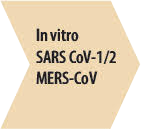            |
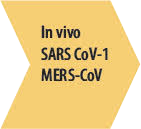 |
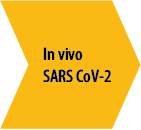  |
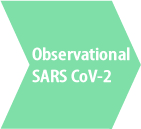 |
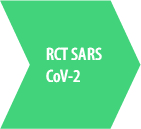       |
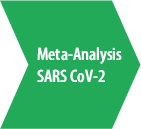 |
Major Peer-reviewed Studies
 Peer Reviewed SARS-CoV2 Randomized Controlled Trial
Peer Reviewed SARS-CoV2 Randomized Controlled Trial
 BLAZE-1 Trial: Blocking Viral Attachment and Cell Entry with SARS-CoV-2 Neutralizing Antibodies
BLAZE-1 Trial: Blocking Viral Attachment and Cell Entry with SARS-CoV-2 Neutralizing Antibodies
Two interim analyses of the BLAZE-1 trial have been published, including a Phase 2 trial evaluating bamlanivimab use in outpatients (Chen, 2021), and a Phase 2/3 trial evaluating the combination of bamlanivimab and etesevimab compared to bamlanivimab monotherapy and placebo (Gottlieb, 2021).
The Chen et al publication looked at three different bamlanivimab doses (700mg, 2800mg, and 7000mg) vs placebo and found the 2800mg dose appeared to accelerate the natural decline in viral load over time. The other doses did not demonstrate a significantly significant difference from placebo for the primary outcome of day 11. The second published trial by Gottlieb et al randomized patients to bamlanivimab monotherapy, bamlanivimab plus etesevimab, or placebo. In this study, bamlanivimab monotherapy, regardless of dose, did not significantly affect the viral load at day 11, however the combination resulted in a statistically significant decrease in viral load compared to placebo at day 11.
The newest Phase 3, unpublished, preliminary data from the BLAZE 1 trial includes 1,035 patients at high risk for progressing to severe COVID-19 and/or hospitalization that were randomized to receive bamlanivimab 2,800mg plus etesevimab 2,800mg (518 patients) or placebo (517 patients). The primary endpoint was the proportion of patients who had a COVID-19-related hospitalization (defined as ≥ 24 hours of acute care) or who died from any cause by day 29. Primary endpoint events occurred in 11/518 (2%) of patients in the bamlanivimab plus etesevimab arm versus 36/517 (7%) of patients in the placebo arm. There were no deaths in the monoclonal antibody arm and 10 deaths in the placebo arm (2%). Patients who received the monoclonal antibody had a 5% absolute risk reduction and 70% relative risk reduction in COVID-19-related hospitalizations or death from any cause (p < 0.001). Secondary endpoints included viral load change from baseline to day 7, persistently high viral load on day 7, or time to sustained symptom resolution. Patients who received the combination product had greater and more rapid decline in viral levels compared to placebo. The proportion of patients with persistently high viral loads at day 7 (defined as viral load > 5.27) was statistically significant between groups with 10% in monoclonal antibody group vs 29% in placebo (p < 0.000001).
List of major peer-reviewed studies providing context for therapy
 Preclinical animal models SARS CoV-2
Preclinical animal models SARS CoV-2
 REGN-COV2 antibodies prevent and treat SARS-CoV-2 infection in rhesus macaques and hamsters. Baum A, et al. Science. 2020 Oct 9.This study evaluated the in vivo efficacy of REGN-COV-2 antibody cocktail in both rhesus macaques, which may model mild disease, and golden hamsters, which may model more severe disease. The study demonstrated that REGN-COV-2 reduced virus load in lower and upper airways and decreased virus induced pathological sequelae when administered prophylactically or therapeutically in rhesus macaques. Similarly, administration in hamsters limited weight loss and decreased lung titers and evidence of pneumonia in the lungs. These results provided evidence of the therapeutic potential of this antibody cocktail.
REGN-COV2 antibodies prevent and treat SARS-CoV-2 infection in rhesus macaques and hamsters. Baum A, et al. Science. 2020 Oct 9.This study evaluated the in vivo efficacy of REGN-COV-2 antibody cocktail in both rhesus macaques, which may model mild disease, and golden hamsters, which may model more severe disease. The study demonstrated that REGN-COV-2 reduced virus load in lower and upper airways and decreased virus induced pathological sequelae when administered prophylactically or therapeutically in rhesus macaques. Similarly, administration in hamsters limited weight loss and decreased lung titers and evidence of pneumonia in the lungs. These results provided evidence of the therapeutic potential of this antibody cocktail.
 Randomized Control Trial - Ebola
Randomized Control Trial - Ebola
 A Randomized, Controlled Trial of Ebola Virus Disease Therapeutics. Mulangu S, et al. N Engl J Med. 2019 Dec 12. A trial of four investigational therapies for Ebola in the Democratic Republic of Congo. Patients who had a positive result for Ebola virus RNA were randomly assigned in a 1:1:1:1 ratio to IV administration of the triple monoclonal antibody ZMapp (the control group), the antiviral agent remdesivir, the single monoclonal antibody MAb114, or the triple monoclonal antibody REGN-EB3. The primary endpoint was death at 28 days. A total of 681 patients were enrolled before the safety monitoring board recommended that patients be assigned only to the MAb114 and REGN-EB3 groups for the remainder of the trial; the recommendation was based on the results of an interim analysis that showed superiority of these groups to ZMapp and remdesivir with respect to mortality. A shorter duration of symptoms before admission and lower baseline values for viral load and for serum creatinine and aminotransferase levels each correlated with improved survival. Both MAb114 and REGN-EB3 were superior to ZMapp in reducing mortality from EVD. This trial provides a supporting basis for the use of monoclonal antibodies in the setting of an emerging viral disease outbreak.
A Randomized, Controlled Trial of Ebola Virus Disease Therapeutics. Mulangu S, et al. N Engl J Med. 2019 Dec 12. A trial of four investigational therapies for Ebola in the Democratic Republic of Congo. Patients who had a positive result for Ebola virus RNA were randomly assigned in a 1:1:1:1 ratio to IV administration of the triple monoclonal antibody ZMapp (the control group), the antiviral agent remdesivir, the single monoclonal antibody MAb114, or the triple monoclonal antibody REGN-EB3. The primary endpoint was death at 28 days. A total of 681 patients were enrolled before the safety monitoring board recommended that patients be assigned only to the MAb114 and REGN-EB3 groups for the remainder of the trial; the recommendation was based on the results of an interim analysis that showed superiority of these groups to ZMapp and remdesivir with respect to mortality. A shorter duration of symptoms before admission and lower baseline values for viral load and for serum creatinine and aminotransferase levels each correlated with improved survival. Both MAb114 and REGN-EB3 were superior to ZMapp in reducing mortality from EVD. This trial provides a supporting basis for the use of monoclonal antibodies in the setting of an emerging viral disease outbreak.
List of pre-peer reviewed/pre-publication studies
 Peer Reviewed SARS-CoV2 Randomized Controlled Trial
Peer Reviewed SARS-CoV2 Randomized Controlled Trial
-
 REGEN-COV Antibody Cocktail Clinical Outcomes Study in Covid-19 Outpatients
REGEN-COV Antibody Cocktail Clinical Outcomes Study in Covid-19 Outpatients
The results from a phase 3 study comparing casirivimab plus imdevimab vs placebo were released in pre-print format on May 21, 2021 (Weinreich et al). This study included 4,057 Covid-19 outpatients with one or more risk factors for severe disease. Patients were randomized to a single treatment of intravenous placebo, or various doses of REGEN-COV, and followed for 28 days. The prespecified hierarchical analysis first compared REGEN-COV 2400mg dose vs concurrent placebo, then compared the 1200mg dose vs concurrent placebo, for endpoints assessing risk of hospitalization or death, and time to symptom resolution. Safety was evaluated in all treated patients. Both REGEN-COV 2400mg and 1200mg significantly reduced COVID-19-related hospitalization or all-cause death compared to placebo (71.3% reduction [1.3% vs 4.6%; p<0.0001] and 70.4% reduction [1.0% vs 3.2%; p=0.0024], respectively). The median time to resolution of Covid-19 symptoms was 4 days shorter in both dose arms vs placebo (10 vs 14 days; p<0.0001). Efficacy of REGEN-COV was consistent across subgroups, including patients who were SARS-CoV-2 serum antibody-positive at baseline. REGEN-COV more rapidly reduced viral load than placebo. Serious adverse events occurred more frequently in the placebo group (4.0%) than in the 1200mg (1.1%) and 2400mg (1.3%) groups and grade ≥2 infusion-related reactions were infrequent (<0.3% in all groups). -
 NCT04452318: A Multi-part Phase 3 trial comparing REGEN-COV (casirivimab/imdevimab) to placebo
NCT04452318: A Multi-part Phase 3 trial comparing REGEN-COV (casirivimab/imdevimab) to placebo
An ongoing multi-part Phase 3 trial with 2 arms. Participants are qualified if they had no COVID-19 symptoms but lived in the same household as an individual who tested positive for COVID-19 within the previous 4 days. They were then tested for SARS-CoV-2 using a nasopharyngeal swab PCR test and participants with a negative test result joined the prevention trial (2069A), while participants with a positive test result joined the treatment trial arm (2069B). Interestingly, this trial is studying the use of subcutaneous administration of casirivimab/imdevimab rather than intravenous administration. Currently, only the IV formulation is available per the EUA.An April 12th, 2021 press release described the Phase 3, double-blind, placebo-controlled 2069A trial preliminary results. 1,505 people who were not infected with SARS-CoV-2 at baseline were randomized to receive either one 1,200 mg dose of subcutaneous REGEN-COV (n = 753) or placebo (n = 752). Through day 29 (primary endpoint), 1.5% (11/753) participants who received REGEN-COV experienced a symptomatic infection compared to 7.8% (59/752) of participants who received the placebo, resulting in a relative risk reduction of 81%. In addition, individuals treated with REGEN-COV who did experience a symptomatic infection on average resolved their symptoms in 1 week compared to 3 weeks with the placebo, a 93% relative reduction. Adverse events were similar between groups.
A second press release, also released April 12th, 2021, provides preliminary results of the 2069B study. 204 participants were included in this study who had no COVID-19 symptoms but tested positive for SARS-CoV-2 with no anti-virus antibodies at baseline. They were randomized to receive either one subcutaneous 1,200 mg dose of REGEN-COV (n = 100) or placebo (n = 104). REGEN-COV reduced the overall risk of progressing to symptomatic COVID-19 by 31% with 29/100 individuals in the REGEN-COV group compared to 44/104 in the placebo group experiencing symptoms. While not one of their initial endpoints, they also noted that no REGEN-COV patients were either hospitalized or visited the ED because of COVID-19 during the 29-day efficacy assessment period, compared to six placebo patients.
-
 BLAZE-2 (Bamlanivimab for prevention of COVID-19 in Nursing Home Residents and Staff)
BLAZE-2 (Bamlanivimab for prevention of COVID-19 in Nursing Home Residents and Staff)
A press release from January 21, 2021 reported initial data from the Phase 3 BLAZE-2 trial that showed bamlanivimab significantly reduced the risk of contracting symptomatic COVID-19 in both residents and staff at long-term care facilities. 956 participants (299 residents and 666 staff members) who tested negative for SARS-CoV-2 were randomized to receive either 4,200mg of bamlanivimab or placebo. At 8 weeks, participants in the bamlanivimab treatment arm had a significantly lower frequency of symptomatic COVID-19 when compared to placebo (OR 0.43, p = 0.00021). Also, the subgroup of nursing home residents had significantly lower cases of symptomatic COVID-19 when treated with bamlanvimab (OR 0.2, p = 0.00026) indicating up to an 80% lower risk of contracting COVID-19 versus those residents randomized to placebo. 4 deaths occurred in the placebo arm of the nursing home residents subgroup with no deaths in the bamlanivimab arm. -
 BLAZE-4
BLAZE-4
The EUA dosing for bamlanivimab plus etesevimab is based on preliminary data from the BLAZE-4 trial, a Phase 2 double-blind randomized controlled trial evaluating bamlanivimab 700mg in combination with a novel monoclonal antibody VIR-7831 (also known as GSK4182136). This data demonstrated that the lower dose had similar antiviral activity when compared to the doses used in BLAZE-1 trial (bamlanivimab 2800mg / etesevimab 2800mg). The novel VIR-7831 is a dual-action monoclonal antibody that can block viral entry into healthy cells as well as provide a high barrier to resistance. It binds to an epitope on SARS-CoV-2 that is also found on SARS-CoV-1, indicating that the epitope is highly conserved and may make it more difficult for escape mutants (and therefore resistance) to develop. -
 ACTIV-3
ACTIV-3
This is an adaptive NIH-sponsored clinical trial investigating multiple agents compared to placebo in adults hospitalized with COVID-19. If an investigational agent appears to be safe and effective based on evaluation of the first 300 participants (stage 1), an additional 700 participants are randomized. The first agent evaluated in the Phase 3, randomized, controlled trial was the mAb LY-CoV555.The Data Safety Monitoring Board reviewed data from the ACTIV-3 trial on Oct. 26, 2020 and recommended no further participants be randomized to receive LY-CoV555 and that the investigators be unblinded to the data. This recommendation was based on a low likelihood that the intervention would be of clinical value in this hospitalized patient population. Enrollment into the LY-CoV555 sub-study closed due to futility with 326 total participants.
 REGN-COV2 Trial
REGN-COV2 Trial
REGN-COV2 is a so-called antibody “cocktail” consisting of a combination of two monoclonal antibodies (REGN10933 and REGN10987). The REGN-COV2 trial was designed to enroll patients in 4 independently randomized cohorts:- Cohort 1: patients on low-flow oxygen (inpatient)
- Cohort 1A: patients not requiring oxygen (outpatient)
- Cohort 2: patients on high-flow oxygen
- Cohort 3: patients on mechanical ventilation
On Oct 30 2020, the independent data monitoring committee (IDMC) recommended halting further enrollment into Cohorts 2 and 3, based on both a potential safety concern and a lack of efficacy. Enrollment into Cohort 1 continues at this time. Of note REGN-COV2 is also one of the interventions being investigated in the RECOVERY trial, and enrollment into this study continues.
List of pre-peer reviewed/pre-publication studies providing context for therapy
 Preclinical in vitro SARS-CoV-2
Preclinical in vitro SARS-CoV-2
Multiple studies characterizing potent neutralizing monoclonal antibodies targeting the spike glycoprotein of SARS-CoV-2. Summarized below.
 Human neutralizing antibodies elicited by SARS-CoV-2 infection. Ju B, et al. Nature 584, 115–119 (2020).
Human neutralizing antibodies elicited by SARS-CoV-2 infection. Ju B, et al. Nature 584, 115–119 (2020). Cross-neutralization of SARS-CoV-2 by a human monoclonal SARS-CoV antibody. Nature 583, 290–295 (2020). Pinto D, et al. Nature 583, 290-295 (2020).
Cross-neutralization of SARS-CoV-2 by a human monoclonal SARS-CoV antibody. Nature 583, 290–295 (2020). Pinto D, et al. Nature 583, 290-295 (2020). A human monoclonal antibody blocking SARS-CoV-2 infection. Wang C, et al. Nat. Commun. 11, 2251 (2020).
A human monoclonal antibody blocking SARS-CoV-2 infection. Wang C, et al. Nat. Commun. 11, 2251 (2020).  Potent neutralizing antibodies against SARS-CoV-2 identified by high-throughput single-cell sequencing of convalescent patients’ B cells. Cao Y, et al. Cell 182, 73–84.e16 (2020).
Potent neutralizing antibodies against SARS-CoV-2 identified by high-throughput single-cell sequencing of convalescent patients’ B cells. Cao Y, et al. Cell 182, 73–84.e16 (2020). Rapid isolation and profiling of a diverse panel of human monoclonal antibodies targeting the SARS-CoV-2 spike protein. Zost SJ, et al. Nat. Med. 26, 1422–1427 (2020).
Rapid isolation and profiling of a diverse panel of human monoclonal antibodies targeting the SARS-CoV-2 spike protein. Zost SJ, et al. Nat. Med. 26, 1422–1427 (2020). Convergent antibody responses to SARS-CoV-2 in convalescent individuals. Robbiani DF, et al. Nature 584, 437–442 (2020).
Convergent antibody responses to SARS-CoV-2 in convalescent individuals. Robbiani DF, et al. Nature 584, 437–442 (2020). Studies in humanized mice and convalescent humans yield a SARS-CoV-2 antibody cocktail. Hanson J, et al. Science 369, 1010–1014 (2020).
Studies in humanized mice and convalescent humans yield a SARS-CoV-2 antibody cocktail. Hanson J, et al. Science 369, 1010–1014 (2020). Antibody cocktail to SARS-CoV-2 spike protein prevents rapid mutational escape seen with individual antibodies. Baum A, et al. Science 369, 1014–1018 (2020).
Antibody cocktail to SARS-CoV-2 spike protein prevents rapid mutational escape seen with individual antibodies. Baum A, et al. Science 369, 1014–1018 (2020). Potent neutralizing antibodies directed to multiple epitopes on SARS-CoV-2 spike. Liu L, et al. Nature 584, 450–456 (2020).
Potent neutralizing antibodies directed to multiple epitopes on SARS-CoV-2 spike. Liu L, et al. Nature 584, 450–456 (2020). Analysis of a SARS-CoV-2-infected individual reveals development of potent neutralizing antibodies with limited somatic mutation. Seydoux E, et al. Immunity, 53, 98–105.e5 (2020).
Analysis of a SARS-CoV-2-infected individual reveals development of potent neutralizing antibodies with limited somatic mutation. Seydoux E, et al. Immunity, 53, 98–105.e5 (2020).